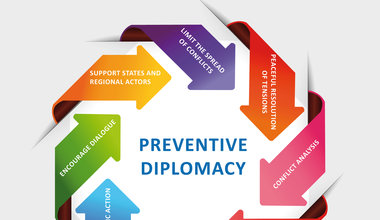One of the tools which intend to stop a conflict, or its escalation is preventive diplomacy. As a common saying goes, “prevention is better than cure”, the concept of preventive diplomacy is a tool to prevent a significant misery, much before its inception. It can get defined as – “a diplomatic mechanism where the social detection and early intervention gets honored as a political negotiation in international matters.” Whenever we talk about diplomacy, it implies a reaction to an event. However, preventive diplomacy is like an outlier, which occurs before the event.
There are three significant the preventive diplomacy can remain most beneficial for us. The first reason is subtly conveyed in the essay. Preventive diplomacy is beneficial as an intervention for a major crisis. The second reason is that it is a relatively feasible tool to operate. It is for another two reasons. Firstly, can trace the war clouds before a war. One of the vital origins of any violence is hatred, which gets bred for centuries. One does not require much hardship to figure out any violence issue which might spark owing to this hatred. The preventive diplomacy tool can be of use in this regard. Secondly, any party in an international conflict can find negotiations and deliberations easy as compared to a hot war. The third reason is that preventive diplomacy is ethical as compared to another action. One can explore various possibilities and angles while going through the process of preventive diplomacy. The observer party is involved which thinks about larger geopolitical scope for anything.
It is not just a theory where preventive diplomacy is beneficial. In practice also it is tested mechanism. Preventive diplomacy is in the fashion since the post-cold war days. Boutros Boutros-Ghali’s Agenda for Peace speech is considered a starting phase of the new diplomatic world order. One of the earliest successes of this tool was in the border dispute between Nigeria and Cameroon in the Bakassi peninsula. Even before the cold war, the Kennedy administration in Washington tried to prevent the escalation of the Cuban missile crisis into a full-fledged nuclear war. UNU-CPR undertook a series of in-depth case studies in Yemen (2011), Nigeria (2015), Malawi (2011), Sudan/Southern Sudan (2010-11), Lebanon (2012-17), and Guinea to examine how the UN helped to prevent violent conflict during key crisis times (2008-10). Preventive diplomacy was successful in almost every case.
We can relate our day-to-day vaccination quest to know how prevention of something is vital to our human life. The idea of preventative diplomacy is one of the great UN ideas that will be around for as long as the international organization exists; for behind it is simple confidence that anything might be done to prevent crises or conflicts should be considered. The essay looked at how preventive diplomacy can remain beneficial for us.









